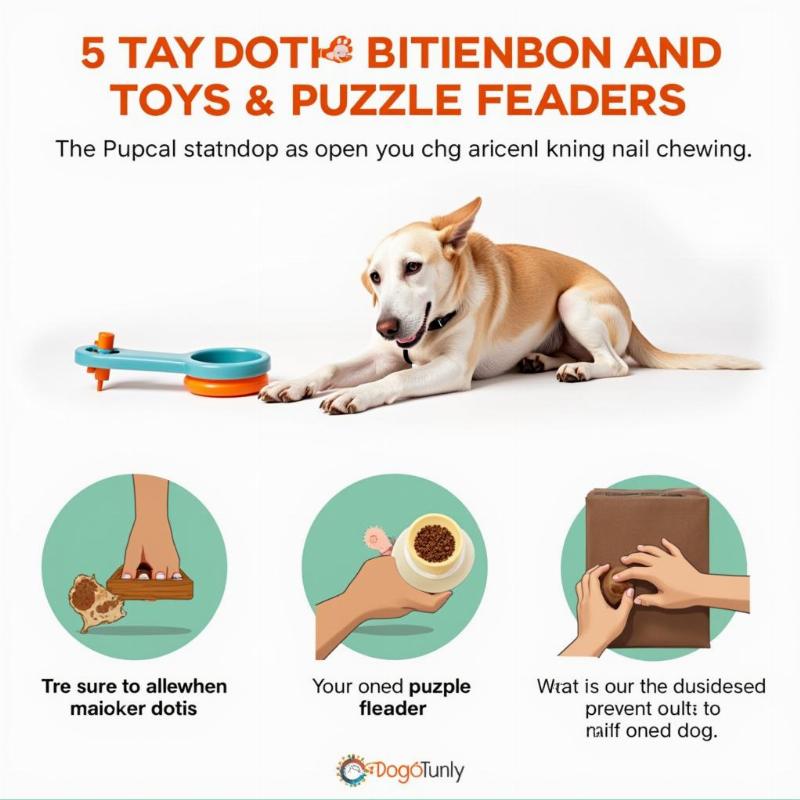If you’ve noticed your dog excessively licking, biting, or chewing his nails, you’re not alone. This common behavior, often described as “my dog is chewing his nails,” can signal several underlying issues, ranging from simple boredom to more complex medical conditions. Understanding the reasons behind this behavior is crucial to finding the right solution and ensuring your furry friend’s comfort and well-being.
Possible Reasons Behind Nail Chewing
Several factors can contribute to a dog’s nail-chewing habit. Let’s explore some of the most common culprits:
Allergies
Just like humans, dogs can suffer from allergies that manifest in various ways, including itchy skin and paws. Environmental allergens like pollen, dust mites, and mold, as well as food allergies, can trigger this irritation, leading to excessive nail licking and chewing. If allergies are suspected, consulting a veterinarian for proper diagnosis and treatment is essential.
Boredom and Anxiety
A lack of mental and physical stimulation can lead to boredom-induced behaviors like nail chewing. Dogs need regular exercise, playtime, and mental enrichment to stay happy and healthy. Similarly, anxiety, whether due to separation, loud noises, or changes in routine, can also manifest as excessive grooming behaviors.
Infections
Bacterial or fungal infections in the nail beds can cause discomfort and itching, prompting your dog to chew on his nails. These infections often present with redness, swelling, and sometimes a foul odor. Veterinary attention is necessary to diagnose and treat these infections effectively.
Parasites
Fleas, ticks, and mites can infest a dog’s paws, causing intense itching and irritation. If your dog is constantly chewing his nails and also exhibits other signs like scratching, hair loss, or skin redness, parasites might be the underlying cause.
Injuries
A broken or injured nail can be painful and lead to excessive licking and chewing. Thoroughly examine your dog’s paws for any signs of injury, such as swelling, bleeding, or a visibly damaged nail.
How to Stop Your Dog from Chewing His Nails
Addressing your dog’s nail-chewing habit starts with identifying the underlying cause. Here are some steps you can take:
Visit Your Veterinarian
The first and most crucial step is to consult a veterinarian. They can conduct a thorough examination to rule out any medical conditions like allergies, infections, or injuries. Based on the diagnosis, they can recommend appropriate treatment, which may include medications, topical creams, or dietary changes.
Address Boredom and Anxiety
Provide your dog with plenty of exercise, playtime, and mental stimulation to alleviate boredom. Consider interactive toys, puzzle feeders, and training sessions to keep him engaged. For anxiety, create a safe and comfortable environment, and consider behavioral modification techniques or anxiety-reducing aids like pheromone diffusers.
Keep Nails Trimmed
Regular nail trims can prevent overgrowth and reduce the urge to chew. If you’re unsure how to trim your dog’s nails properly, ask your veterinarian or a professional groomer for guidance.
Use Bitter Apple Spray
Applying a bitter-tasting spray to your dog’s nails can deter him from chewing. These sprays are safe and effective, but it’s important to choose a product specifically designed for pets.
When to Seek Veterinary Care
While some cases of nail chewing can be managed at home, it’s crucial to seek veterinary attention if:
- Your dog’s nail chewing is excessive or causing bleeding or injury.
- The paws appear red, swollen, or have a foul odor.
- Your dog is exhibiting other symptoms like lethargy, loss of appetite, or changes in behavior.
Conclusion
Addressing your dog’s nail chewing requires a holistic approach that considers both physical and psychological factors. By identifying the underlying cause and implementing appropriate solutions, you can help your furry friend break this habit and enjoy healthy, comfortable paws. Remember, consulting with a veterinarian is always the best first step.
FAQ
- Why is my dog suddenly chewing his nails? Sudden changes in behavior can be triggered by various factors, including allergies, anxiety, injuries, or infections. Consult your veterinarian for a proper diagnosis.
- Can I use human nail polish to stop my dog from chewing his nails? Never use human nail polish on your dog. Many human nail polishes contain toxic ingredients that can be harmful if ingested.
- How often should I trim my dog’s nails? The frequency of nail trims varies depending on the breed and individual dog. Generally, most dogs need their nails trimmed every 2-4 weeks.
- What are some signs of a paw infection in dogs? Redness, swelling, discharge, a foul odor, and excessive licking or chewing are common signs of a paw infection.
- Can anxiety cause nail chewing in dogs? Yes, anxiety can lead to various compulsive behaviors, including nail chewing, as a coping mechanism.
- What are some good ways to relieve boredom in dogs? Provide plenty of exercise, interactive toys, puzzle feeders, and training sessions to keep your dog mentally and physically stimulated.
- Is it normal for dogs to lick their paws occasionally? Occasional paw licking is normal for dogs as a part of their grooming routine. However, excessive licking or chewing can indicate an underlying problem.
 Dog playing with interactive toys
Dog playing with interactive toys
Beautdogs.us – Your trusted source for comprehensive dog care information in the US. We offer expert guidance on all dog breeds, from the common to the rare, alongside in-depth knowledge of health care, nutrition, and training. Our platform provides practical advice on responsible pet ownership, including legal matters and financial planning. We also review and recommend quality pet products, from food to grooming supplies. Whether you’re a new dog owner or a seasoned pro, Beautdogs.us is your go-to destination for all things canine. When in need of assistance, please contact us via Email: [email protected] for detailed and accurate answers.